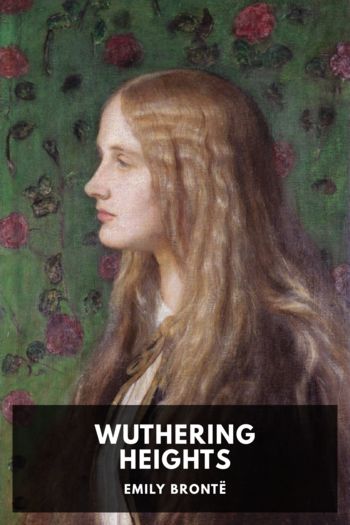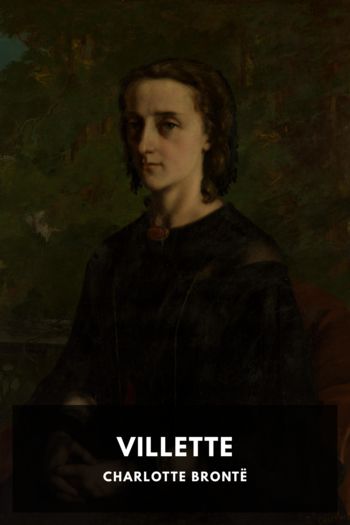Shirley by Charlotte Brontë (best books to read for teens .TXT) 📕

- Author: Charlotte Brontë
Book online «Shirley by Charlotte Brontë (best books to read for teens .TXT) 📕». Author Charlotte Brontë
But one project could she frame whose execution seemed likely to bring her a hope of relief: it was to take a situation, to be a governess; she could do nothing else. A little incident brought her to the point, when she found courage to break her design to her uncle.
Her long and late walks lay always, as has been said, on lonely roads; but in whatever direction she had rambled—whether along the drear skirts of Stilbro’ Moor or over the sunny stretch of Nunnely Common—her homeward path was still so contrived as to lead her near the Hollow. She rarely descended the den, but she visited its brink at twilight almost as regularly as the stars rose over the hillcrests. Her resting-place was at a certain stile under a certain old thorn. Thence she could look down on the cottage, the mill, the dewy garden-ground, the still, deep dam; thence was visible the well-known countinghouse window, from whose panes at a fixed hour shot, suddenly bright, the ray of the well-known lamp. Her errand was to watch for this ray, her reward to catch it, sometimes sparkling bright in clear air, sometimes shimmering dim through mist, and anon flashing broken between slant lines of rain—for she came in all weathers.
There were nights when it failed to appear. She knew then that Robert was from home, and went away doubly sad; whereas its kindling rendered her elate, as though she saw in it the promise of some indefinite hope. If, while she gazed, a shadow bent between the light and lattice, her heart leaped. That eclipse was Robert; she had seen him. She would return home comforted, carrying in her mind a clearer vision of his aspect, a distincter recollection of his voice, his smile, his bearing; and blended with these impressions was often a sweet persuasion that, if she could get near him, his heart might welcome her presence yet, that at this moment he might be willing to extend his hand and draw her to him, and shelter her at his side as he used to do. That night, though she might weep as usual, she would fancy her tears less scalding; the pillow they watered seemed a little softer; the temples pressed to that pillow ached less.
The shortest path from the Hollow to the rectory wound near a certain mansion, the same under whose lone walls Malone passed on that night-journey mentioned in an early chapter of this work—the old and tenantless dwelling yclept Fieldhead. Tenantless by the proprietor it had been for ten years, but it was no ruin. Mr. Yorke had seen it kept in good repair, and an old gardener and his wife had lived in it, cultivated the grounds, and maintained the house in habitable condition.
If Fieldhead had few other merits as a building, it might at least be termed picturesque. Its regular architecture, and the gray and mossy colouring communicated by time, gave it a just claim to this epithet. The old latticed windows, the stone porch, the walls, the roof, the chimney-stacks, were rich in crayon touches and sepia lights and shades. The trees behind were fine, bold, and spreading; the cedar on the lawn in front was grand; and the granite urns on the garden wall, the fretted arch of the gateway, were, for an artist, as the very desire of the eye.
One mild May evening Caroline, passing near about moonrise, and feeling, though weary, unwilling yet to go home, where there was only the bed of thorns and the night of grief to anticipate, sat down on the mossy ground near the gate, and gazed through towards cedar and mansion. It was a still night—calm, dewy, cloudless; the gables, turned to the west, reflected the clear amber of the horizon they faced; the oaks behind were black; the cedar was blacker. Under its dense, raven boughs a glimpse of sky opened gravely blue. It was full of the moon, which looked solemnly and mildly down on Caroline from beneath that sombre canopy.
She felt this night and prospect mournfully lovely. She wished she could be happy; she wished she could know inward peace; she wondered Providence had no pity on her, and would not help or console her. Recollections of happy trysts of lovers, commemorated in old ballads, returned on her mind; she thought such tryst in such scene would be blissful. Where now was Robert? she asked. Not at the Hollow; she had watched for his lamp long, and had not seen it. She questioned within herself whether she and Moore were ever destined to meet and speak again. Suddenly the door within the stone porch of the hall opened, and two men came out—one elderly and white-headed, the other young, dark-haired, and tall. They passed across the lawn, out through a portal in the garden wall. Caroline saw them cross the road, pass the stile, descend the fields; she saw them disappear. Robert Moore had passed before her with his friend Mr. Yorke. Neither had seen her.
The apparition had been transient—scarce seen ere gone; but its electric passage left her veins kindled, her soul insurgent. It found her despairing, it left her desperate—two different states.
“Oh, had he but been alone! had he but seen me!” was her cry. “He would have said something. He would have given me his hand. He does, he must, love me a little. He would have shown some token of affection. In his eye, on his lips, I should have read comfort; but the chance is lost. The wind, the cloud’s shadow, does not pass more silently, more emptily than he. I have been mocked, and Heaven is cruel!”
Thus, in the utter sickness of longing and disappointment, she went home.
The next morning at breakfast, where she appeared white-cheeked and miserable-looking as one who had seen a ghost, she inquired of Mr. Helstone, “Have you any objection, uncle, to my inquiring for a situation in a family?”
Her uncle, ignorant as the table





Comments (0)